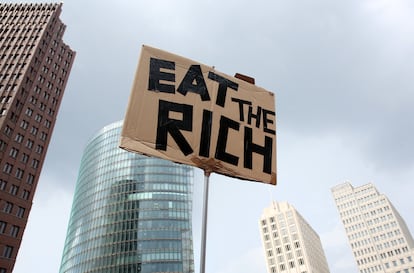Seen from the outside, Donald Trump’s war against elite universities is hard to justify. Harvard, Columbia, and Princeton — to name just three of the institutions under threat — are fundamental pillars of American hegemony. The country’s economic power would not be the same without the appeal these research centers hold for top talent from around the world.
From the inside, however, the picture changes. In a poll released in May by the National Opinion Research Center and the Associated Press, only 45% of Americans said they opposed Trump’s decision to cut funding to Ivy League universities that did not end their minority inclusion programs. Among Republican voters, the numbers were even more striking: only 22% opposed Trump’s crusade against the universities.
The rebellion against institutions linked to the elite isn’t unique to the United States. In Latin America, the proportion of citizens who say they prefer democracy over any other form of government has dropped from 65% in 1998 to 52% in 2024, according to Latinobarómetro surveys. This trend is also visible on the other side of the Atlantic in the rise of far-right parties across the European Union, which claim to defend the interests of “the people” with fiery rhetoric against “globalist” elites — while largely ignoring the national ones.
Where does the anger come from? Have the conditions of those at the bottom worsened? Or have those at the top grown so distant that it’s become obscene? The answer may well be a combination of both. On the lower end, rising rents have dramatically reduced the purchasing power and quality of life of people without inheritances or access to mortgage loans, while wages across the population have risen more slowly than inflation.
According to sociologist Julián Cárdenas of the University of Valencia in Spain, the loss of purchasing power, the insecurity inherent in precarious employment, and the entirely understandable fear of being forced out of an affordable rental have all contributed to a general decline in quality of life. “Ordinary people see that the economy is doing well, that businesses are growing, but they are finding it increasingly difficult to make ends meet,” he says.
According to Cárdenas, who is part of the Latin American Elite Network research group (REAL), what’s new about this anti-elite sentiment is its breadth: it includes not only middle classes frustrated by the decline in quality of life, but also working classes “who have traditionally tended to trust the elites, as they provide a more distinct social position and are seen as the ones responsible for generating wealth.”
If those at the bottom are doing significantly worse, those at the top are doing far better. According to the most recent data from Oxfam (July 2024), in just a decade, the wealthiest 1% of the global population increased their net worth by $42 trillion — a figure 34 times greater than the total wealth increase of the poorest 50% of the world’s population.
Another way to see it is through the growing wage gap. According to an analysis by the Economic Policy Institute, in 1965, CEOs in the United States earned 21 times more than the average worker; by 2023, that ratio had risen to 290.
The need for a ‘story’
As sociologist Aaron Reeves — who researches elite formation at the London School of Economics — puts it, the spectacular concentration of wealth has radically transformed the lives of a very small number of people, “making them very, very, very different from most people — their money has become so enormous that it’s changed the world they live in.”
In his book Born to Rule, published in 2024 by Harvard University Press, Reeves and his co-author, Sam Friedman, argue that it is precisely this vast separation that has led some elites to feel the need to justify themselves and convince the rest of the population “that they’re not different, that they’re normal.”
“When you have the kind of money Elon Musk has, how do you justify that? How do you make it seem acceptable when there are billions of impoverished people living difficult lives even in high-income countries like Spain or the United Kingdom,” Reeves asks.
In their view, this search for acceptance by the elites is expressed through displays of popular cultural tastes, emphasis on working-class origins, or publicly adopting an attitude that values hard work. From Donald Trump raving about McDonald’s hamburgers to Mark and Priscilla Zuckerberg announcing their intention not to leave their entire fortune to their daughter.
Not all elites need to create a “story,” says Reeves. “Members of the financial elite feel less pressure because they’re not such public figures, but the most visible businesspeople and politicians have a harder time ensuring that the life they lead — completely separate from the rest of us — doesn’t have negative consequences,” he explains. “There’s a Trump quote that illustrates this perfectly: ‘I consider myself a blue-collar worker,’ he says, even though he’s never had a manual or laboring job in his life, and his family has nothing to do with it.”
The “story” varies depending on the country. “Generalizing slightly, elites in Denmark tend to place more emphasis on hard work when asked how they got there, while those in the United Kingdom tend to emphasize talent, with statements like ‘I’m very good at this,’” Reeves explains. In his opinion, these differences have to do with the culture of each nation. “It’s not that hard work isn’t valued in the United Kingdom; it’s valued just as much as everywhere else. But in a nation like Denmark, where social democracy has been very important, hard work is emphasized before talent.”
Meritocracy and rentier system
The sense of alienation that much of the population feels toward the elites encompasses both asset owners and top executives who have built their fortunes through labor income. As Daniel Markovits, a law professor at Yale University, puts it, the level of wealth accumulated by this elite over their working life “is a complete game-changer for their families.” “In the United States, many people between 50 and 70 have accumulated so much money through their labor that their children will never have to work. We’re talking about a generation born of meritocracy approaching retirement age who can, if they want, turn their descendants into old-fashioned rentiers,” he says.
Markovits wonders whether the rest of society will be willing to accept this. “What will happen to inheritance taxes and perpetual trusts? Common-law countries have laws against such trusts, created solely to keep descendants from having to work, but several U.S. states have already removed these restrictions,” he says. “It seems like the number is $1 billion: if you reach that amount, you don’t have to worry about your children ever having to work; unless you have a lot of them, no one in your family will have to work again, which would mean a return to a pre-meritocratic era.”
According to sociologist Mariana Heredia, a researcher at Argentina’s National Scientific and Technical Research Council (Conicet) and author of the essay The 99% Against the 1%?, there is no doubt that the changes of the last five decades have benefited elites and harmed workers in the Western world. The set of decisions that led to the deregulation of the global financial system and much closer trade integration in the 1970s, she explains, “allowed the relocation of industrial companies to Asia and a restructuring of international trade.”
According to Heredia, “those with capital clearly emerged as winners from some of these decisions because they acquired the prerogative of placing their surpluses on a global platform, where they were offered the best conditions for their productive and financial investments.” “In addition, the various technological leaps we have seen since then have been aimed at saving labor, not generating it, especially in large organizations, another factor that has made them less vulnerable to potential worker claims,” she says.
The people who made those decisions in the 1970s didn’t necessarily know they would benefit the owners of capital, Heredia points out, referring to decisions adopted to solve a problem that, “as a side effect of the new configuration, generates a set of winners and losers.” That doesn’t mean, of course, that the elites didn’t allow — or even tacitly support — the development and expansion of decisions that directly benefited them, even if those decisions weren’t deliberately designed for that purpose.
Anatomy of power
The way economic elites influence politics is not always straightforward, explains Heredia. Of course, when they perceive the possibility of legislation that could harm them, they react directly to try to prevent it. But the daily work of lobbying groups “is much more discreet than one might imagine.” Much of it involves shaping how problems are presented and framed, which in turn influences the kinds of solutions pursued, and either neutralizes decision-making or, at the very least, “guides it in a certain direction.”
 From left to right, Mark Zuckerberg, Lauren Sánchez, Jeff Bezos, Sundar Pichai and Elon Musk, at Donald Trump's inauguration on January 20.JULIA DEMAREE NIKHINSON (POOL / AFP / GETTY IMAGES)
From left to right, Mark Zuckerberg, Lauren Sánchez, Jeff Bezos, Sundar Pichai and Elon Musk, at Donald Trump's inauguration on January 20.JULIA DEMAREE NIKHINSON (POOL / AFP / GETTY IMAGES)Although the power of economic elites is always considered in terms of their ability to influence laws and regulations, Heredia draws attention to a new power that some elites have acquired, one that is “less visible, but perhaps much more decisive.” “I just completed an electronic transaction online, and the platform required me to show my face to recognize me and proceed,” she explains. “No state has ever had as much information about its citizens as digital platforms have today, without clear criteria for how they can use it or for what purpose.”
In Argentina, Heredia is part of the World Elite Database (WED), an international working group that aims to improve knowledge about elites in the 15 member countries. As WED explains, the goal is to add to the abundant and necessary work on poverty worldwide by investigating the people who have the greatest influence over others due to their position on the social ladder, in order to understand why certain decisions are made.
Using 2020 data, WED’s first snapshot, published just a few months ago, reveals several recognizable patterns. Unfortunately, one is easy to anticipate: men dominate the elites in all participating countries. This gender gap is repeated throughout the sample, with the lowest figures in China, Russia, Chile, and Argentina; and the highest — though still low— in the Scandinavian countries. In the former group, women make up less than 10% of the elite; in the latter, around one-third. The places of origin are also predictable. Except in the United Kingdom and Switzerland, where more than a third of the economic elite members were born in other countries, the vast majority were born in the same nation where they wield their power.
When it comes to education, there are no surprises either. “In the United States, Ivy League universities are very important for the elite. Having a doctorate or postgraduate studies at Harvard or MIT is common among businesspeople, allowing them to recognize each other and have the opportunity to network, develop affinities, and pool information and advantages,” says Heredia. “China is distinguished by its greater dispersion in terms of birth and also education; members of its elite come from very different regions, even from more or less rural areas. Meanwhile, in Argentina, and to some extent also in France, there is a very significant geographic concentration in the capital cities.”
What’s more, according to Heredia, U.S. and British educational centers have grown “at the expense of other, more nationally prestigious institutions, with some local schools trying to replicate the formula by becoming as cosmopolitan as possible to fare well in this new ranking.”
“It could also have been the case that Latin Americans preferred to attend business schools in Spain, or that humanities students chose Mexico or Buenos Aires, but what has actually happened is that everyone wants to go to Harvard or prestigious universities in England; Spaniards, Brazilians, and Colombians attend these institutions because it allows them to appropriate their global prestige and to become familiar with the language in which much of today’s economic and academic exchange takes place,” she explains.
 Protest against rent prices in Berlin. ADAM BERRY (AFP / Getty Images)
Protest against rent prices in Berlin. ADAM BERRY (AFP / Getty Images)Trump shakes up the status quo
Peter Turchin, Emeritus Professor at the University of Connecticut, has been studying elites for over a decade using models similar to those employed in mathematical biology, his primary discipline. In 2010, the mathematical models based on his historical database predicted the instability looming over the United States and Western Europe due to the surplus of young people with higher education degrees — a forecast confirmed by events such as Brexit in the U.K., Donald Trump’s first election in the U.S., and the Yellow Vest protests in France against social injustice.
According to Turchin, Trump’s second term represents a revolution in which a counter-elite has taken power, displacing the traditional elite, much like what happened in France after 1789 or in Russia after 1917. “J. D. Vance, the current vice president, said it clearly a couple of years ago: ‘We are going to fire all the bureaucrats up to the middle ranks and replace them with our people.’ It’s difficult because they face a lot of resistance, but that’s what they are doing,” he explains.
To support his thesis, Turchin summarizes the radical change in three pillars on which U.S. hegemony rested. “In geopolitics, the U.S. strategy was to start wars and subjugate other countries by force or regime change; in the global economy, to maintain the dollar as the global currency and a tariff regime highly favorable to the U.S.; and culturally, to export American values perceived by the Muslim world and Russia as an imposition, such as LGBTQ+ rights,” he says. “The MAGA movement wants to leave that entire world order behind: focusing on its own hemisphere — hence the Greenland and Panama moves — dismantling the tariff system and opposing LGBTQ+ rights.”
If Trump’s movement is a revolution, it doesn’t seem to benefit those harmed by capital liberalization and trade integration. “The first elites leading a revolution are usually not very effective; they are good at destroying everything but not at building; that was the case in the French and Russian revolutions,” says Turchin. “We have to let some time pass, with much trial and error, and maybe a second revolution.” The revolution devours its children, as they used to say in France.
Based on parameterized models using variables such as inequality indices and average wages, Europe still has some way to go before reaching the revolutionary moment the U.S. is experiencing — except for the U.K., “where the UKIP party is a fairly organized revolutionary movement,” he notes.
“Germany was 20 years behind the U.S. when the measure we use for inequality started to worsen, and France was a bit further behind; which is good news because it means there hasn’t been enough progress on the road to crisis,” he says. “On the other hand, when I look at the current ruling elites — [Keir] Starmer in London; [Emmanuel] Macron in Paris; or [Friedrich] Merz in Berlin — I see completely delusional policies… Instead of budgeting billions of dollars for war, they should be directing them to improving the well-being of society; in the U.K., which is the closest to a revolutionary moment, a significant portion of the population simply cannot afford to heat their homes in winter.”
His hope is that European elites will follow the example of early 20th-century American elites, who allowed an increase in inheritance taxes among other progressive reforms to prevent the creation of a hereditary aristocracy. “In the United States, they were in a revolutionary situation, but they managed to quell it by implementing a set of reforms,” Turchin says. “That’s my hope for Europe because I don’t want what’s happening in the United States to happen there; revolutions are destructive; it’s much better to reform.”
Sign up for our weekly newsletter to get more English-language news coverage from EL PAÍS USA Edition
.png)




